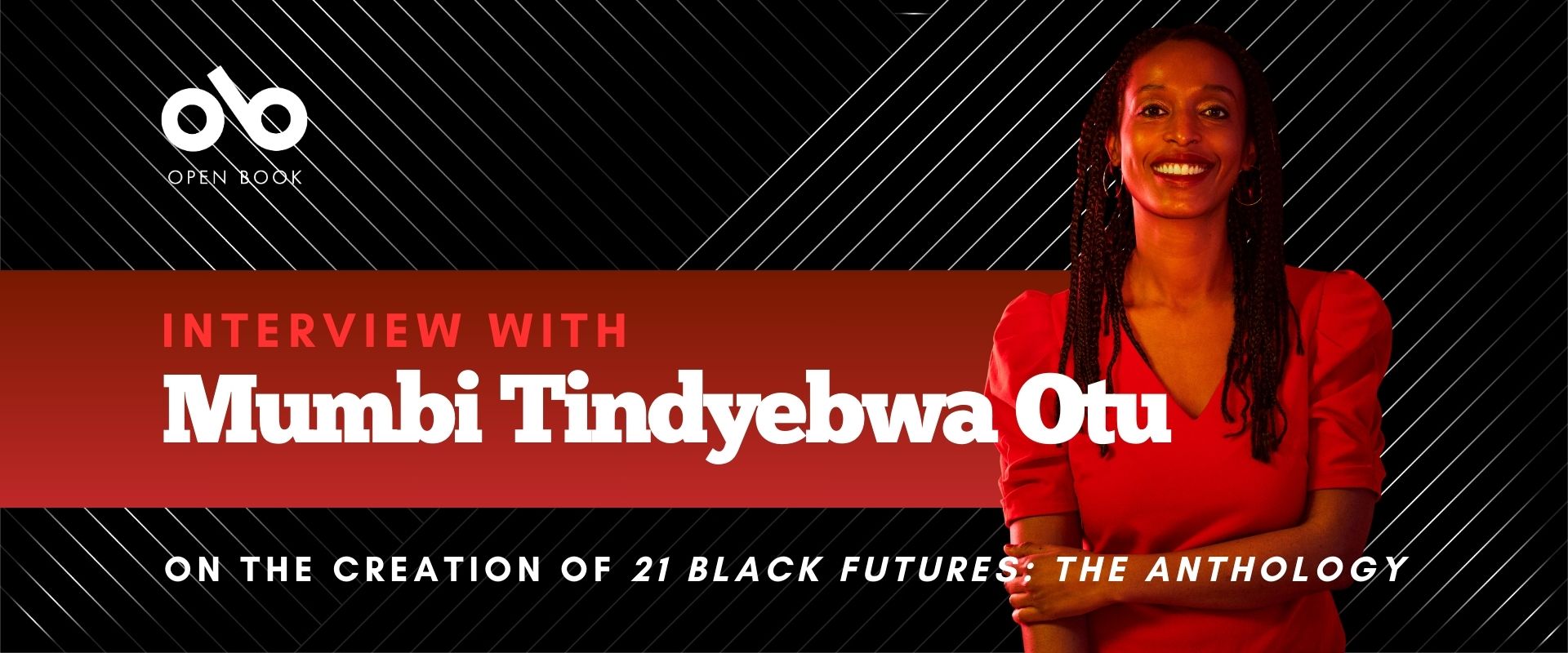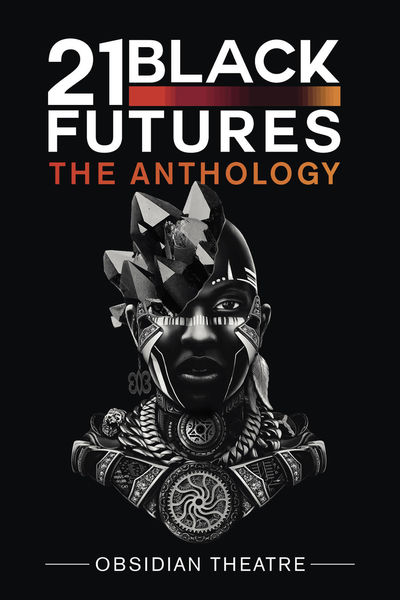Mumbi Tindyebwa Otu on Collecting 21 Answers to the Question "What is the Future of Blackness?"
In 21 Black Futures: The Anthology, Obsidian Theatre, Canada's leading theatre for Black art, imagines the future of Blackness. Gathering 21 of the country's most talented writers, the anthology collects 21 ten-minute scripts that each answer the question "What is the future of Blackness?" in their own unique way.
With plays by Amanda Parris, Cheryl Foggo, Shauntay Grant, Kaie Kellough, Lawrence Hill, Motion, and many others, 21 Black Futures is a arresting collection crackling with powerful, fresh writing. It was originally created to celebrate the company's 21st anniversary in 2021 and to give space for writers coping with the isolation of the pandemic and the trauma stemming from heightened and public violence toward Black bodies.
Filled with diverse perspectives, styles, and subjects, from some of the most exciting voices in fiction, theatre, and film, the anthology was curated by Obsidian artistic director Mumbi Tindyebwa Otu. The final pages contain joy, rage, hope, humour, power, and beauty, with each entry its own absorbing universe.
We were lucky enough to speak with Mumbi about her vision for the collection and how a project so grand in scale came together. She told us about the project appearing on CBC Gem, about how "imagining the future has always been a part of what Black creators have done through art", about cold-calling Lawrence Hill, and more.
Open Book:
Tell us about the new book and how you became involved with it.
Mumbi Tindyebwa Out:
21 Black Futures an anthology of 21 short monodramas by Black Playwrights across Canada that were created in 2020 in response to the question: What is the Future of Blackness. I commissioned the plays in 2020 right after beginning my tenure as Obsidian Theatre’s artistic director. The plays were created in the midst of the global pandemic and the social unrest and a renewed global awareness of anti Black racism and police Brutality.
OB:
What drew you, personally, to this subject matter, and why was this the right time to gather pieces in book form?
MTO:
When I started at Obsidian, I was hurting alongside other members of my community at the continued murder of Black folk in the hands of police. We were in the midst of a pandemic, and as a theatre artist, all my upcoming projects had disappeared, and normally, the theatre, a place where i would go to gather with artists and wrestle with the things happening in the world, was totally shut down and we had no idea when we would be able to make “live theatre” again. I was also a new artistic director, faced with the choice of whether to wait out the pandemic or whether to create new programming that was responding to the times. I chose the latter.
All the playwrights we asked to be a part of the project immediately said yes as they were also craving community during a really challenging time. All the pieces aired on CBC Gem in Feb 2021 for a year. It felt that after this really charged moment it was important to not only immortalize these pieces in book form, as a reminder of a really important moment in Black history and theatre art making, but also as a beacon of hope to future generations of theatre makers and thinkers, regarding what is possible re-imagining the future of Blackness. Imagining the future has always been a part of what Black creators have done through art, i.e. in movements such as Afro-surrealism and Afro-futurism, so 21 Black Futures, fits in that longer ancestral lineage of storytelling. Imagining the future, and immortalizing it through the written word is an act of resistance against systemic and historic erasure of Black folks lives, Black words, and Black value.
OB:
How did you select the pieces for this book? What were you looking for when assembling it?
Your CanLit News
Subscribe to Open Book’s newsletter to get local book events, literary content, writing tips, and more in your inbox
MTO:
I selected writers with the goal of creating a really diverse portrait of Blackness across the country. I was interested in writers writing in every corner of the country, from Nunavut, to Montreal, to BC to Calgary to Nova Scotia, etc. I was also interested in having multigenerational perspectives on the question: what is the future of Blackness? I therefore was interested in writers who had been writing for a long time; veterans such as Djanet Sears and writers who had never written a play. I was also interested in the diversity of languages within the Black communities in the country; the anthology features one piece in French and one that was translated to ASL. I was also interested in writers coming to ‘playwrighting’ from different artistic forms. For example, Lawrence Hill, a renowned novelist, writing his first play, as well as Kaie Kellough, a Montreal based poet, and Motion, a spoken word artist and playwright, etc.
OB:
How do you view the pieces in the book as speaking to each other?
MTO:
All the pieces in the anthology are in response to the same question: What is the Future of Blackness? There are parallel themes of Hope, love, doubt, resilience, and so much more capture a glimpse of the diverse humanity of what it means to walk on this planet as Black person.
OB:
What do you need when you're writing and editing – in terms of space, food, rituals, writing instruments?
MTO:
Quiet time. I am mom of two very adorable but very loud almost eight year olds, so i try and do most of my writing at night after bedtime or when they are in school. Also signing off from my emails so that I can focus on being creative.
OB:
What do you hope readers will take away from these pieces, after having read them all? Is there a question you set out to address or delve into through these works?
MTO:
I really hope that this book will make readers feel inspired, and that they will be moved to celebrate the rich diversity of these stories. This book is like a collection of paintings with each being so unique and different from the other, so I hope that brings a lot of joy. I hope there is just a deeper and greater appreciation of the diversity of the Black experience and stronger allyship towards the telling of our stories. I hope the book inspires younger artists to continue to create new work, even in hard times! and also that this book serves as a jumping point for many other creations for folks nationally and internationally.
OB:
Did you get to work with any writers you already knew for this project? Tell us a bit about those pieces and how you worked with the writers you knew prior to this book?
MTO:
Yes, I knew a lot of the writers who were Toronto or Ontario based, even if i hadn’t directly worked with most of them. I had to do a lot of research and get recommendations from the community regarding writers working predominantly in other parts of Canada.
Motion, writer of "Rebirth of the Afronauts" is probably one of my closest collaborators in the list of 21 Writers. Together we have created and collaborated on four projects including Oraltorio: A Theatrical Mixtape which was produced by both Obsidian and Soulpepper Theatre a few years back. Other projects we have worked on together include Dancing to A White Boy Song, Motherland/Because I love You, and Nightmare Dream.
OB:
Are there any writers you discovered through this project? What, if anything, surprised you about the writers whose work you came to through this book?
MTO:
Lawrence Hill was a cold call reach out for this project and I was amazed he responded! I read The Book of Negroes years ago and loved it and just thought his perspective and the sheer weight he carries as a writer would be huge for the project so I reached out and he was game!
Miali, who wrote "BlackBerries" was a completely new writer, to whom an old friend of mine from Nunavut connected me. She was a newer writer; mixed race Indigenous and Black. Other newer writers included Stephie Mazunya, who wrote the French piece "Chronologie" as well as Kaie Kellough, who I also reached out to blindly based on reading about him online.
I was really pleasantly surprised and moved by how excited they all were to come on board, how united they were in the desire to further explore what Blackness meant for the here and now even through all their different lenses. Also there was very little ego involved. It was truly a community effort from all the different artists, from the most experienced writers to the least experienced.
OB:
How do you view the role of an editor in relation to an anthology or collection?
MTO:
The role has been about working with the publisher to provide another platform for the work to exist beyond what was originally presented as filmed mono-dramas. It has been extending the conversation about and around the work with our audiences. It has been about supporting writers to be able to revisit their work and think about what they want to say about it, almost three years since originally writing it. It has also been about having an opportunity to think about what we want the impact of the work to be now and in the future.
OB:
What are you working on next?
MTO:
Right now I am excited about the possibility of creating a new creative hub for Black Canadian work that can gestate over a long period of work. I am excited about being able to give the work the resources and support to breathe but also working with writers in a way that is guaranteeing their work will be produced and that it won’t just die in development land.
_______________________________________________________
Obsidian is Canada’s leading culturally specific theatre company with a threefold mission to produce plays, develop playwrights, and train emerging theatre professionals. Obsidian is passionately dedicated to the exploration, development, and production of the Black voice. Obsidian produces plays from a worldwide canon focusing primarily, but not exclusively, on the works of highly acclaimed Black playwrights. Obsidian provides artistic support, promoting the development of work by Black theatre makers and offering training opportunities through mentoring and apprenticeship programs for emerging Black artists.
Mumbi Tindyebwa Otu is an acclaimed theatre creator and director raised in Kenya and Victoria, BC and based in Toronto. She is the Artistic Director of Obsidian Theatre, Canada’s leading creator for Black Art as well as Founder/Artistic director for the experimental theatre company IFT (It’s A Freedom Thing Theatre) Theatre. Recent directing credits, Post Democracy (Tarragon), Is God Is (Obsidian/Canadian Stage/Necessary Angel) Cast Iron (Obsidian/Factory), 21 Black Futures (Obsidian/CBC Arts), Trout Stanley (Factory Theatre), The Brothers Size, Ma Rainey’s Black Bottom (Soulpepper Theatre), We are Proud to Present (UofT Scarborough), and Oraltorio: A Theatrical Mixtape for (Obsidian Theatre/Soulpepper). Mumbi is also the recipient of many awards including a Canadian Screen Award, a Dora Award, a Toronto Theatre Critics Award, a Pauline McGibbon Award and a Mallory Gilbert Protege Award.





